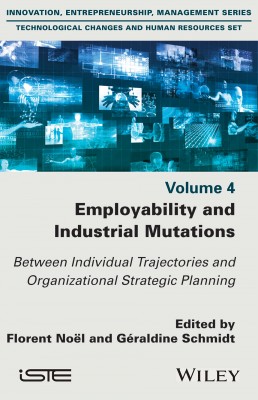
Industrial, economic and organizational mutations are creating a transformation in employment, skills and work. Developing the employability of the workforce is one response to these challenges. However, the link between mutations and employability is not obvious: it must be constructed and implemented in order to ensure that employees are able to reach satisfying professional situations.
Employability and Industrial Mutations presents a definition of employability and the associated challenges for public authorities, organizations and employees: managing unemployment, successful change and employee empowerment. It then examines several worker profiles to better understand what “being employable” means. It goes on to analyze several examples of management systems for employability at different stages of an individual’s career, and finally explores the issue of developing or maintaining employability in real-life situations and contexts.
This book brings together researchers and practitioners from a range of different fields in order to shed light on the complex relationship between mutations and employability.
Part 1. Towards a General Theory of Employability.
1. Employability and Public Policy: A Century-long Learning Process and Unfinished Process, Bernard Gazier.
2. Employability as a Managerial Imperative?, Florent Noël and Géraldine Schmidt.
3. Capability-based Employability: A Total Organizational Fact, Bénédicte Zimmermann.
Part 2. Employability and Individual Trajectories.
4. The “Unemployable”: Different Figures, Between Societal Construction and Unconscious Meanings, Raymonde Ferrandi.
5. Staying in the Game: Employability and Mobile Careers in the IT Industry, Pauline De Becdelièvre, Jean-Yves Ottmann and Cindy Felio.
6. Employability in the Era of Digitization of Job, Martina Gianecchini, Paolo Gubitta and Sara Dotto.
Part 3. Career Stages, HRM and Employability.
7. The MRS, a Device in Favor of Employability and Social Performance, Anne-Laure Gatignon-Turnau and Séverine Ventolini.
8. Recruiting in Innovative Activities: From the Impossible Search for a Match to the Construction of Employability, Thierry Colin, Benoît Grasser and Fabien Meier.
9. Reclassification and Employability: A Reading in Terms of Boundary Objects, Ève Saint-Germes.
10. Being Employable, a Matter of Context, Sara Dotto, Patrick Gilbert, Florent Noël and Nathalie Raulet-Croset.
Part 4. Employability and Work Situations.
11. What are the Possible Futures in the Factories of the Future? The Case of Operators in an Aeronautics Company, Emmanuelle Garbe and Jérémy Vignal.
12. Digital Technologies as a Lever for Developing the Employability of Middle Managers, Anne-Laure Delaunay.
13. Work as a Factor of Integration and Employability: The Case of Trisociété, Emmanuelle Begon and Michel Parlier.
Florent Noël is a professor at IAE Paris – Sorbonne Business School, France, where he is responsible for the HR and CSR master’s degree and the M.A.I. (Mutations, Anticipation and Innovation) chair. His research focuses on employment management in companies and, more broadly, on restructuring practices.
Géraldine Schmidt is a professor at IAE Paris – Sorbonne Business School, France, and a member of the M.A.I. chair. Her research focuses on restructuring practices in companies and SSE organizations, and the relationship between art and management.